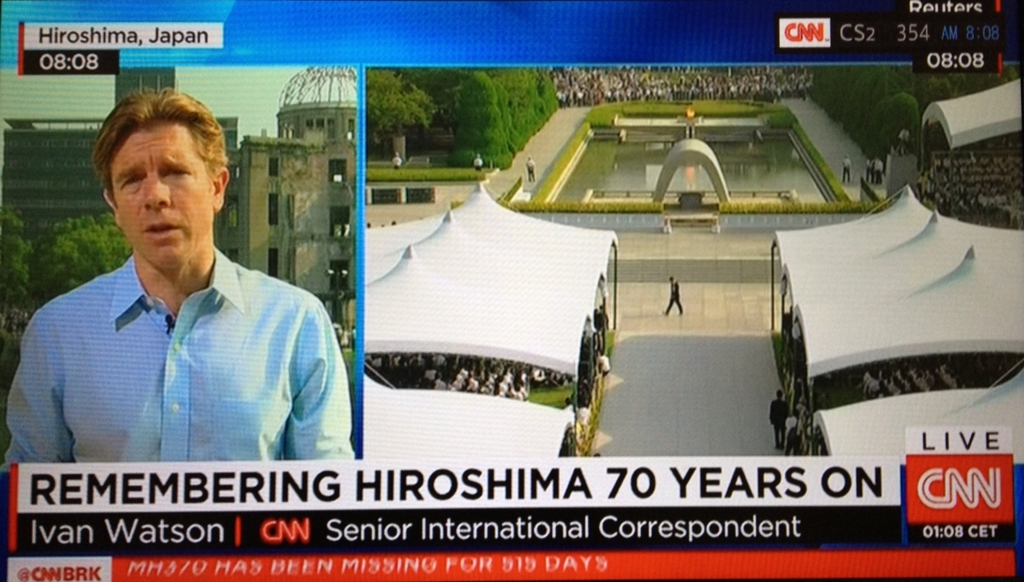8月6日, 毎朝の日課のCNNjをつけたら広島が映っていました。平和記念式典。
日本が映ることはほとんどありません。直近では民間機墜落の事件と, 高校野球のヌンチャク君が映りましたが。
出勤の時間と重なり, 全てを見れなかったのは残念でしたが, 式典横にいるアメリカ人レポーターとニュースキャスターとの質問のやりとりが秀逸でしたので, iPhoneで少しだけ録音してみました。
音だけを公開するのはどうやら難しいようですが・・・何か方法はないのかなぁ。

ニュースの要約
70年という節目の年に
・アメリカ人として学んだことと, 広島に来て感じることは大きく異なる
・憲法改正など, これまでの日本とは異なる議論が進んでいる
ニュースの英語というのは, 原稿を読む場合以外は考えながら話しているので,
・彼らの発言にある あー とか うー とかは全て筆者が省きました。
・同じことを複数回言っている箇所がありますが, それらは文中に含めています。
・文法的に間違っていたり, and が等しいものをつないでいない場合があったりしますがニュースは口語英語なので仕方がありません。
以上の点を大目にみていただくとして, 下記がおおよその発言内容でした。(日本語は筆者訳)
現場のレポーター
The textbooks taught me for example, growing up in the US, that the bombing of Hiroshima and a few days later of Nagasaki, that they were basically necessary evils, that the US had to slaughter hundreds of thousands of civilians to bring about a swifter end of WWII, i.e., to basically save lives.
アメリカの教科書で習ったことは,
広島・長崎の爆撃は「必要悪」であり, アメリカは第二次世界大戦を終わらせるため, 命を救うために何十万もの民間人を殺害する必要があった ということです。
※ swift: 迅速な・早い(形式ばった語)
→スズキの車種名, 最近登場したiOSアプリのプログラミング言語名
・・・とするとTaylor Swiftさんも何か早かったんだろうか
※ WWII: World War Two
※ i.e.: in other words
ラテン語については:
番外編4: 英語に出てくるラテン語 大事なもの一覧 - dutcheez’s diary
I’ve spoken to teenage American boy scouts who’ve gone through a very graphic displays in the museum of peace that has been erected here in Hiroshima, who were visibly sickened by the images of children burned in the blast 70 years ago and who were grappling only 14-, 15-, 16-year olds with very difficult questions:
広島の平和記念資料館を訪れたアメリカ人ボーイスカウトの青年たちにインタビューをしました。彼らは平和記念資料館内の過激な展示 たとえば70年前に焼かれた子供たちの展示をみて, 心を痛めた様子だったのですが, 14−16歳くらいの彼らには難しい疑問があがってきたようです。
※ erect: 直立状態, 建てられた
※ grapple: とっくみあう
Did we have to do this? Was this absolutely necessary? and we have the luxury of hindsight because these 16-year olds didn’t face the possibilities that they would be sent into the pacific and to possibly fight and die in that terrible war;
それは 本当に, 絶対的に必要だったのかという疑問。
16歳くらいの中高生たちには「後から考えられる」特権がある, というのも
太平洋におくりこまれて戦死する可能性がほとんどないってこと。
... but the discomfort that the teenagers felt that I might feel here, also appears to be shared by US government over the years. It took 65 years for US ambassador to come to the annual commemoration ceremonies here in Hiroshima just 5 years ago, and this year the very first time the US government sent an undersecretary of state also attend the ceremony here which also suggests that the US government has had some discomfort observing this grim anniversary.
この中高生たちの感じているこういった違和感は私自身も感じ得るし, アメリカ政府関係者にとってもそれは同じことだと思います。
アメリカ駐日大使の肩書きを持つ人がこの平和記念式典に出席するのに65年もの歳月を必要としました。この広島で, 政府関係者が初めて出席したのはたった5年前ですし, 今年初めてアメリカ政府は国務次官を出席させました。米国政府にとっても, 毎年訪れるこの陰鬱な記念日に対して, なんらかの違和感を抱いていたという証拠にほかなりません。
(黙祷による中断)
スタジオのアナウンサー
Let's go back to the original sort that the situation that Japan finds itself in after its postwar pacifist constitutional posture now, some seeking change to that.
もう一回 日本の人が平和憲法についてどう考えているかについての話題に戻りましょう。戦後から続いてきた平和憲法への考え方について変更を望んでいる人もいるようですが?
※ postwar: 戦後 (対義語, prewar: 戦前)
※ pacifist constitution: 平和憲法
※ posture: 姿勢
現場のレポーター
... Your question about contemporary times: the government of the Japanese PM Shinzo Abe has embarked a very controversial policy here in Japan and that is to change the pacifist constitution to essentially allow Japan to assist in joint military operations something that is very difficult and basically prevented legally for this country to do and supporters are arguing these are different times now:
North Korea, not far away, a nuclear armed neighbor that has fired missiles over Japan, China is resurgent with the world’s second largest economy but also a growing military and there are territorial disputes in the South China Sea; direct territorial disputes involving Japan and so some Japanese are saying these days it’s not enough to just say world peace; we have to be more pragmatic and recognized that there are new threats in the world and perhaps we cannot purely rely on our US ally for military protection against these potential threats.
今の質問は現代の日本政府(安倍政権)が論戦を巻き起こすような政策を打ち出していることについてですね? つまり平和憲法の変更を求め, 日本の法律で禁止されている軍隊活動を根本的に認めてしまうことになる。。。
この意見に賛成の人は憲法が制定された時代と今とは全くことなるということを主張しています。
北朝鮮: 日本とはそう離れていないこの国は, 日本の方向へミサイルを打ったことがあり, 核兵器で武装しています。
中国:世界で2番目の経済大国を誇りつつも, 日本と南シナ海上の陸地について領土問題が尽きない状態となっています。
「世界平和と言っているだけではダメだ」と主張している日本人がいます。
もっと実用的にならないといけないと。そして
かつてはなかった脅威が 今はあり, こういった脅威に対する防衛を, 日本は同盟国アメリカに頼りきっていていいのかということを周りにわかってもらわないといけないと。
That’s been a very controversial debate here with a segment of Japanese society that is present here praying by the A-Bomb Dome saying we can’t dare go down the path that Japan went down the devastating path that led to WWII, invading and occupying neighboring countries like China, like southeast Asia;
そして先の意見と真っ向から対立している意見が目前にあります。すなわち
原爆ドーム周辺で祈っている日本人は
日本を第二次世界大戦に導き, 中国や東南アジアを侵略・支配するような同じミスをしてはならないと主張しています。
...so this is a profound time for the Japanese society as well and the speakers that are gathered here, PM Abe, the Mayor of Hiroshima amid that debate,
also repeated the call for nuclear non-proliferation saying never again, we must never see a disaster like the one 70 years ago, when the atomic bomb flash went off in the sky, exactly 70 years ago.
ここの瞬間は日本人社会にとってとても大切なものです。
首相, 広島市長等ここでスピーチをする人たちも先にあげた激論の渦中にありながらも, 核の廃絶を再度訴え, 70年前のような原爆による壊滅状態を生み出すことがないように祈念しているのです
・・・訳しにくいところが多かったですが
原爆に関するアメリカの報道機関が伝えたことの, 雰囲気だけでもつかんでいただけたら幸いです。
8月7日晩に投稿したものは, なんだか訳がてきとうすぎたので
編集しなおしました。ご迷惑をおかけしました。(8月8日午後)
↓目次へもどる↓
